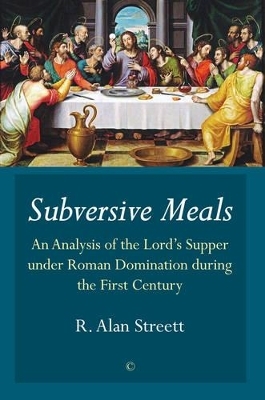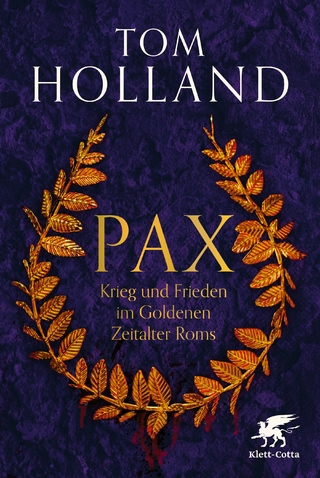
Subversive Meals PB
James Clarke & Co Ltd (Verlag)
978-0-227-17615-3 (ISBN)
- Titel nicht im Sortiment
- Artikel merken
In Subversive Meals, Alan Streett follows on from James C Scott's idea of a "hidden transcript" to argue that the Lord's Supper was a subversive, non-violent act against the Roman Empire. Primarily through exegesis of the writings of Luke and Paul, Streett examines the political nature of the meal in the context of first-century Roman domination. In his widely researched argument, Streett illuminates for the reader why understanding the Lord's Supper as a purely symbolic act overlooks the political significance it would have had in the first century CE. Subversive Meals analyses how the structure of the Lord's Supper followed that of a Roman banquet by having a deipon and a symposium, the latter being the time when anti-resistance discussions would take place. Streett examines several aspects of the history, context and theological significance of the Lord's Supper. He discusses such topics as the identification of Passover as an anti-imperial meal against the Pharaoh's rule, the Roman domination system, the meal practices of Jesus, the eschatological meaning of the Last Supper, the practice of this anti-imperial work ethic in the early church, and the gift of prophecy as a symposium activity. By seeing the Lord's Supper as a political act, readers will be able to study Scriptural passages more closely and precisely.
R. Alan Streett (PhD, University of Wales) is Senior Research Professor of Biblical Exegesis and the W. A. Criswell Endowed Chair of Expository Preaching at Criswell College, Texas.
Acknowledgments
1 Introduction
1.1 Statement of the Problem
1.2 Need for the Study
1.3 The Importance of the Study
1.4 Objectives of the Study
1.5 Limitations of the Study
1.6 Outline of the Study
2 The Roman Banquet as a Model for the Lord's Supper
Part 1 The Structures and Kinds of Roman Banquets
2.1 Introduction
2.2 The Roman Banquet: An Overview
2.3 The Structure of Roman Banquets
2.4 The Ethical Foundation of the Banquet
2.5 Various Types of Banquets
2.6 Christian Communal Meals
Part 2 Voluntary Associations and Anti-Imperialism
2.7 Different Kinds of Associations
2.8 The Roman Banquet as the Heart of the Association Meeting
2.9 The Association as a Model for the Local Church
2.10 The Potential Anti-Imperial Threat of Associations
2.11 Scenario
2.12 Conclusion
3 The Passover as an Anti-Imperial Activity
3.1 Introduction
3.2 Exodus from Egypt
3.3 Excursus: The Fourfold Purpose of Memory
3.4 The Eating of the Passover and the March from Egypt
3.5 Passovers as Liturgical Enactments
3.6 Passover during the Divided Kingdom
3.7 Prophetic Pronouncements of Judgment and Restoration
3.8 Returning Exiles Reinstitute the Passover
3.9 Hellenization and Passover
3.10 Passover under Roman Imperialism
3.11 Conclusion
4 The Jesus Movement in Its First-Century CE Context
4.1 Introduction
4.2 The Jewish Experience of Domination
4.3 The Roman Empire as a Domination System
4.4 The Administration of Palestine
4.5 Jewish Resistance to Domination
4.6 Jesus as a Political Prophet
4.7 The Dove and the Donkey: Jesus as God's Anti-Imperial Caesar
4.8 Jesus as God's Caesar
4.9 The Church Preaches an Anti-Imperial Message
4.10 Conclusion
5 Jesus' Lukan Meals as a Venue to Proclaim His Anti-Imperial Gospel of the Kingdom
5.1 Introduction
5.2 Eating with Saints and Sinners: A Picture of the Kingdom
5.3 Meals in Luke: Eating with Saints and Sinners
5.4 Excursus: A Brief Word about the Other Meals in the Gospel of Luke
5.5 Conclusion
6 The Last Supper as an Anti-Imperial Banquet
6.1 Introduction
6.2 The Last Supper as a Passover Meal
6.3 A Pre-Supper Plot to Kill Jesus
6.4 Arranging and Preparing the Passover
6.5 Jesus' Final Passover: Opening Remarks
6.6 The First Cup
6.7 Reinterpreting the Passover Meal
6.8 Aligning with the Imperial Powers
6.9 Anti-Imperial Instructions
6.10 The Giving of a Kingdom
6.11 From Last Supper to Lord's Supper
6.12 Conclusion
7 The Anti-Imperial Nature of Christian Meals
7.1 An Anti-Imperial Interpretation of 1 Cor 11:23-26
7.2 Other Ways the Christian Meal can be Viewed as Anti-Imperial Praxis
7.3 Conclusion
8 Prophecy as an Anti-Imperial Meal Activity
8.1 Introduction
8.2 Prophecy in the Book of Acts
8.3 Prophecy in First Corinthians
8.4 First Thessalonians 5:19-22
8.5 Symposia Prophecy in the Apocalypse
8.6 Excursus: Revelation 3:20
8.7 Conclusion
9 Conclusion
Bibliography
Scripture Index
| Erscheinungsdatum | 02.12.2016 |
|---|---|
| Verlagsort | Cambridge |
| Sprache | englisch |
| Themenwelt | Geschichte ► Allgemeine Geschichte ► Altertum / Antike |
| Geschichte ► Teilgebiete der Geschichte ► Religionsgeschichte | |
| Religion / Theologie ► Christentum ► Kirchengeschichte | |
| ISBN-10 | 0-227-17615-4 / 0227176154 |
| ISBN-13 | 978-0-227-17615-3 / 9780227176153 |
| Zustand | Neuware |
| Haben Sie eine Frage zum Produkt? |
aus dem Bereich


